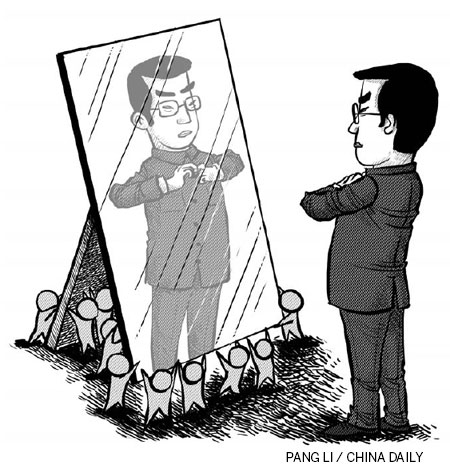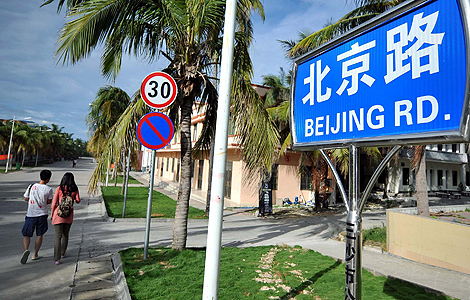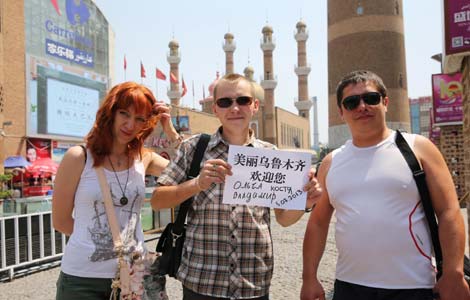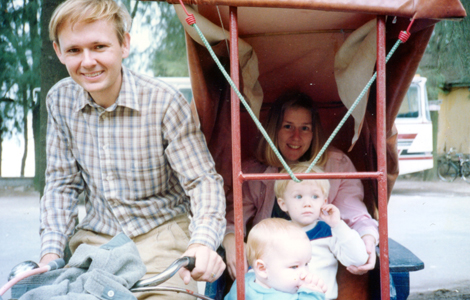Study history, be close to the people
Updated: 2013-07-09 07:10
By Chung-yue Chang (China Daily)
|
||||||||

History, or the study of history, is in the political limelight again.
President Xi Jinping gave a series of important speeches during the June 22-25 study conference of the Political Bureau of the Communist Party of China Central Committee. The terms "staying close to the people" and "study more history" stood out for their additional importance in his speeches. According to Xi, studying history will help CPC members to be close to the people and to serve them better.
While the formal theme of the study conference was "socialist theories and practice with Chinese characteristics", its focus was on how the CPC, because of the prolonged indifference of some of its members, can keep up its tradition of "being close to the people". This indeed is a critical task.
"Winning or losing public support is an issue that concerns the CPC's survival or extinction," Xi emphasized in one of his speeches. But as a crowning move to end the conference, Xi turned to the "study of history". To remain close to the people, senior Party members must study history, particularly the history of the 92-year-old CPC and the 64-year-old People's Republic of China, he said. "History is the best textbook," and it must be a "compulsory course" for all senior officials.
The hard reality is that "keeping close to the people" has become a problem for the CPC in recent years. Some Party officials have made it a habit of keeping aloof from the people. Such officials can be easily identified, because they also indulge in undesirable working styles, such as formalism, bureaucratism, hedonism and extravagance.
A top-down, yearlong "thorough cleanup" campaign has been launched to eradicate the undesirable working styles and to prevent a chasm from developing between the Party and the people. So the four-day Political Bureau conference not only provided the occasion for its members to self-reflect, but also allowed the CPC's top body to take the leading role in the cleanup campaign.
The cleanup campaign, which is definitely pro-people, has two elements to it. The first is its rule-oriented aspect, which involves devising formal measures, guidelines, requirements, evaluations and regulations to help standardize and guide the behavior and performance of CPC officials and members within "acceptable range". This means the people will judge whether officials' behavior and performance are pro-people.
The standardization guidelines include the "eight measures" worked out in December to fight bureaucratism and cut red-tapism. They also include "standardized officials' welfare entitlements" to offices, housing, cars, staff, social welfare and vacations. The State Council's 58-point Government Work Rule, issued last March, is also a part of the guidelines, as are the official performance evaluation system and Xi's "five-point requirement" to help Political Bureau members and other senior Party officials to improve their work.
The campaign's other element is self-transformation orientation. Aside from urging Party officials to follow objective rules and guidelines, the campaign will also encourage them to transform themselves internally so that their pro-people behavior and performance not only meets the standardized requirements or guidelines, but also becomes a matter of internal drive (self-transformation) and personal choice.
By combining the two elements, the pro-people pattern of the campaign will first meet the requirements of external standardization and then lead toward a higher level of self-transformation among CPC members and officials. Those who fulfill the standardization criteria will also be encouraged to strive for higher self-transformation. In Xi's plain language on higher self-transformation, every CPC member is urged to "see oneself in the mirror (CPC Constitution), groom oneself (away from misconduct), take a bath (keep a clean mind), and seek remedies (education or punishment)".
Xi advocates "self-purification, self-perfection, self-transformation and self-elevation". To be able to serve the people with heart and soul, Xi has urged CPC members to transform themselves and again adopt the "mass line", just as Party members did during revolutionary times to build ties with people at the grassroots.
Almost two years ago, Xi gave a speech at the Central Party School on the importance of studying history. He has talked about history again. But he is more specific this time: 92 years of CPC history, 64 years of PRC history, 30-odd years of reform and opening-up history, 170 years of China's modern history, and of course 5,000 years of China's cultural history. The narratives for each of these histories are diverse, but their common element is the presence of China's "people first" ideal and practice, traceable to Confucius and Mencius.
Indeed, history will teach, inspire and induce Party members and officials to be close to and to serve the grassroots people. The above discussion is the self-generated renewal of specific institutions, the CPC and the PRC. All human institutions have to necessarily go through renewals, because great and lasting institutions thrive on renewals, which are often self-generated.
In this sense the renewal of the CPC and the PRC are part of the "great renewal of the Chinese nation", and are thus integral to the fulfillment of the "Chinese Dream".
The author teaches philosophy at Montclair State University, New Jersey, US.
(China Daily USA 07/09/2013 page12)

 China's youngest city glistens under palm trees
China's youngest city glistens under palm trees
 Xinjiang tourism recovering
Xinjiang tourism recovering
 Quebec disaster death toll jumps to 13
Quebec disaster death toll jumps to 13
 Mourn for students in San Francisco air crash
Mourn for students in San Francisco air crash
 Rolling stone finally settles
Rolling stone finally settles
 Double-decker bus caught fire in Shanghai
Double-decker bus caught fire in Shanghai
 China, Russia begin live-fire navy drill
China, Russia begin live-fire navy drill
 Grape expectations for Xinjiang county
Grape expectations for Xinjiang county
Most Viewed
Editor's Picks

|

|

|

|

|

|
Today's Top News
China improves maritime law enforcement
Air crash victims' families arrive in SF
Hopes are high for US, China talks
Laden's life on the run revealed
US mulls hastening withdrawal from Afghanistan
China's inflation grows 2.7% in June
Country singer Randy Travis in critical condition
Police look for suspects in Brazil soccer slaying
US Weekly

|

|







